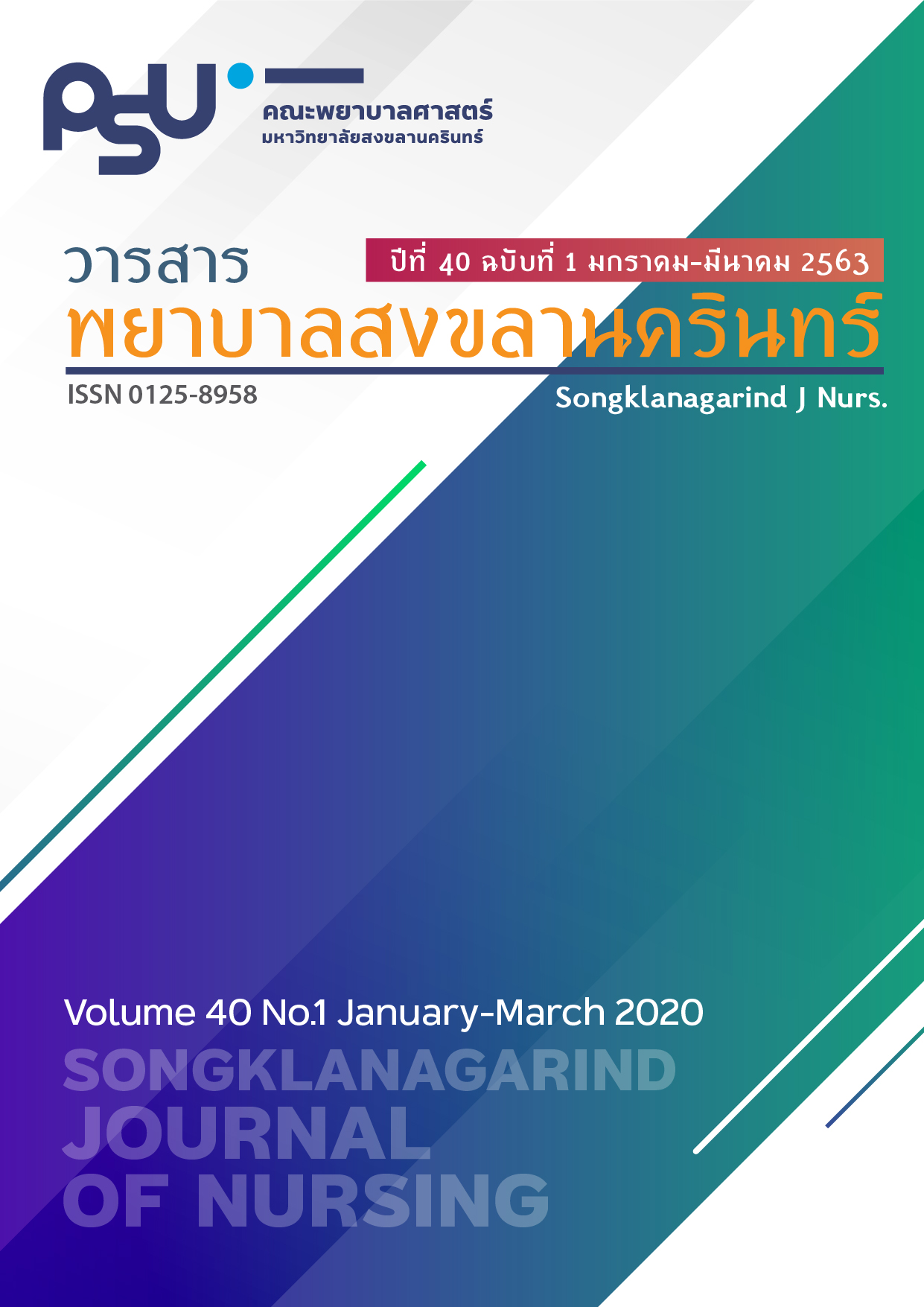Experiences of Stroke Patients Receiving Palliative Care in Community: A Phenomenological Study
Main Article Content
Abstract
This phenomenological study aimed to describe and explain stroke patients’ experiences in receiving palliative care in community. Participants were 15 stroke patients. Data were collected via in-depth interviews from May 2016 to May 2017. Data were analyzed using van Manen’s method. Trustworthiness was established following the criteria of Lincoln and Guba.
The findings revealed that experiences of stroke patients receiving palliative care in a community were described 7 thematic categories. These categories were reflecting within the four lived worlds: 1) lived body consisted of feeling of hopelessness, worthless, and burdensome; and strengthen the mind by using Buddhist practices; 2) lived time emprised time to learn the truths of life; and time of attempt to fight, with hope for recovery; 3) lived space comprised searching places for healing; 4) lived relation consisted of acknowledging help and support from family members, and 7) acknowledging help and support from community healthcare providers.
The findings help to gain more understanding about stroke patients receiving palliative care in a community. In addition, the findings can be used as basic information in developing a care model for stroke patients receiving palliative care in communities.
Article Details
References
Centers for Disease Control and Prevention. Stroke Fact Sheet 2017 [Internet]. Washington: Department of Health and Human Services [cited 2019 Dec 27]. Available from: https:// www.cdc.gov/dhdsp/data_statistics/fact_sheets/fs_stroke.htm
Tiamkao S. Development of the stroke service system in the 7th health zone. Journal of Thai Stroke Society. 2019; 18(1): 25-41. Thai.
Hanchaiphiboolkul S, Poungvarin N, Nidhi nandana S, et al. Prevalence of stroke and stroke risk factors in Thailand: Thai Epidemiologic Stroke (TES) Study. J Med Assoc Thai. 2011; 94(4): 427-36.
Steigleder T, Kollmar R, Ostgathe C. Palliative care for stroke patients and their families: Barriers for implementation. Front Neurol. 2019; 10: 164. doi: 10.3389/fneur.2019.00164.
WHO. Definition of palliative care [Internet]. Geneva: WHO [cited 2019 Dec 27]. Available from: www.who.int/cancer/palliative/definition/en
Wee B, Adams A, Eva G. Palliative and endof-life care for people with stroke. Curr Opin Support Palliat Care. 2010; 4(4): 229-32. doi:10.1097/SPC.0b013e32833ff4f8.
Horrigan-Kelly M, Millar M, Dowling M. Understanding the key tenets of Heidegger’s philosophy for interpretive phenomenological research. Int. 2016; 15: 1-8. doi: 10.1177/1609406916680634.
van Manen M. Researching lived experience: human science for an action sensitive pedagogy. New York: Suny Press, 1990.
Rangsit City Municipality. General informationof Rangsit City [Internet]. Department of Public Health and hygiene [cited 2019 Dec 27]. Available from: http://rangsit.org/New/index. php/th/2014-11-07-07-51-09/typography Thai.
Lincoln YS, Guba EG. Naturalistic inquiry. Newbury Park, CA: Sage Publications; 1985.
Sathirapanya C, Sathirapanya P. Factors influencing depression among patients with stroke. Songkhla Med J. 2005; 23(Suppl 2): 229-37.
Rochette A, Tribble DS, Desrosiers J, et al. Adaptation and coping following a first stroke: A qualitative analysis of a phenomenological orientation. Int J Rehabil Res. 2006; 29(3): 247-49.2006/08/11. doi: 10.1097/01.mrr.0000230051. 24228.c8.
Visalo P. Wining death with empty heart. Bangkok: Busy-day Publishing, 2011. Thai.
Aich TK. Buddha philosophy and western psychology. Indian J Psychiatry. 2013; 55(Suppl 2):S165-70. doi: 10.4103/0019-5545.105517.
Piriyakoontorn S, Balthip Q, Naka K. Experiences of the rural elderly with chronic illnesses in applying the Buddha’s teachings to their life. Songklanagarind J Nurs. 2014; 34(2): 39-52.
Yang NC. Yeh SH. An experience applying a spiritual care model to a first-time stroke patient. Hu li za zhi. 2012; 59(3): 113-18.
Dedkhard S. Effects of rehabilitation programusing complementary therapy in stroke patients. J Prapokklao Hosp Clin Med Educat Center.2015; 32(2): 135-46. Thai.
Panjinda W, Chucherd P. Achieving a holistic approach in stroke rehabilitation. APHEIT. 2016; 5(2): 70-78. Thai.
Lutz BJ, Young ME, Cox KJ, et al. The crisis of stroke: Experiences of patients and their family caregivers. Top Stroke Rehabil. 2011; 18(6): 10.1310/tsr1806-1786. doi: 10.1310/tsr1806-786.
Hare R, Rogers H, Lester H, et al. What do stroke patients and their carers want from community services?. Fam Pract 2006; 23(1): 131-6.2005/11/26. doi: 10.1093/fampra/cmi098.


